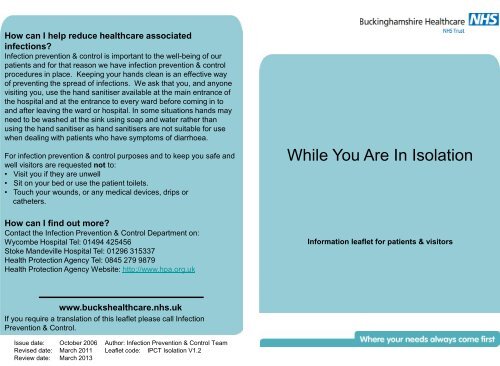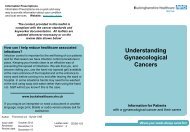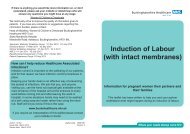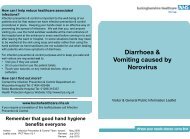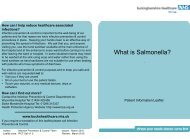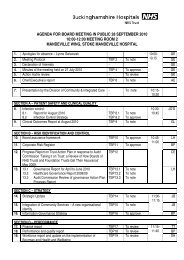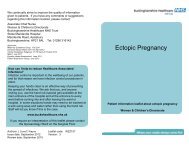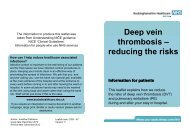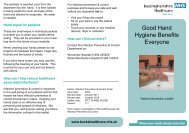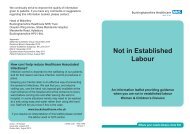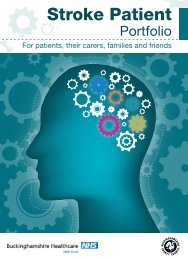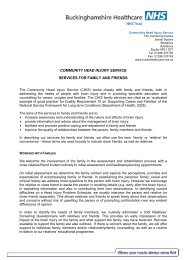While you are in isolation - patient information leaflet
While you are in isolation - patient information leaflet
While you are in isolation - patient information leaflet
You also want an ePaper? Increase the reach of your titles
YUMPU automatically turns print PDFs into web optimized ePapers that Google loves.
How can I help reduce healthc<strong>are</strong> associated<strong>in</strong>fections?Infection prevention & control is important to the well-be<strong>in</strong>g of our<strong>patient</strong>s and for that reason we have <strong>in</strong>fection prevention & controlprocedures <strong>in</strong> place. Keep<strong>in</strong>g <strong>you</strong>r hands clean is an effective wayof prevent<strong>in</strong>g the spread of <strong>in</strong>fections. We ask that <strong>you</strong>, and anyonevisit<strong>in</strong>g <strong>you</strong>, use the hand sanitiser available at the ma<strong>in</strong> entrance ofthe hospital and at the entrance to every ward before com<strong>in</strong>g <strong>in</strong> toand after leav<strong>in</strong>g the ward or hospital. In some situations hands mayneed to be washed at the s<strong>in</strong>k us<strong>in</strong>g soap and water rather thanus<strong>in</strong>g the hand sanitiser as hand sanitisers <strong>are</strong> not suitable for usewhen deal<strong>in</strong>g with <strong>patient</strong>s who have symptoms of diarrhoea.For <strong>in</strong>fection prevention & control purposes and to keep <strong>you</strong> safe andwell visitors <strong>are</strong> requested not to:• Visit <strong>you</strong> if they <strong>are</strong> unwell• Sit on <strong>you</strong>r bed or use the <strong>patient</strong> toilets.• Touch <strong>you</strong>r wounds, or any medical devices, drips orcatheters.How can I f<strong>in</strong>d out more?Contact the Infection Prevention & Control Department on:Wycombe Hospital Tel: 01494 425456Stoke Mandeville Hospital Tel: 01296 315337Health Protection Agency Tel: 0845 279 9879Health Protection Agency Website: http://www.hpa.org.uk<strong>While</strong> You Are In IsolationInformation <strong>leaflet</strong> for <strong>patient</strong>s & visitorswww.buckshealthc<strong>are</strong>.nhs.ukIf <strong>you</strong> require a translation of this <strong>leaflet</strong> please call InfectionPrevention & Control.Issue date: October 2006 Author: Infection Prevention & Control TeamRevised date: March 2011 Leaflet code: IPCT Isolation V1.2Review date: March 2013
Why do I need to be isolated?Bacteria and viruses can cause a variety of human <strong>in</strong>fections.These can sometimes cause problems <strong>in</strong> hospitals, therefore,special c<strong>are</strong> is needed to reduce the risk of spread<strong>in</strong>g <strong>in</strong>fection toother <strong>patient</strong>s and staff. Some <strong>patient</strong>s <strong>are</strong> also more at risk of<strong>in</strong>fection because of their illness and need to be <strong>in</strong> <strong>isolation</strong> tohelp protect them from catch<strong>in</strong>g <strong>in</strong>fections.What is <strong>isolation</strong>?Sometimes it is necessary to move <strong>patient</strong>s to a s<strong>in</strong>gle room,(which may have its own toilet/wash<strong>in</strong>g facilities) or to adedicated bay <strong>in</strong> a ward (sometimes called a cohort bay). This isoften referred to as ‘<strong>isolation</strong>’. Be<strong>in</strong>g <strong>in</strong> <strong>isolation</strong> allows healthc<strong>are</strong> workers to reduce the risk of spread<strong>in</strong>g any <strong>in</strong>fection to <strong>you</strong>or other <strong>patient</strong>s. Staff may wear gloves, aprons and/or masksdepend<strong>in</strong>g on the reason <strong>you</strong> <strong>are</strong> be<strong>in</strong>g isolated. The staff willexpla<strong>in</strong> this to <strong>you</strong>. Please feel free to ask staff if <strong>you</strong> would likemore <strong>in</strong>formation about any aspects of <strong>you</strong>r c<strong>are</strong>.How is <strong>in</strong>fection spread?The risk of acquir<strong>in</strong>g or spread<strong>in</strong>g <strong>in</strong>fection can be higher while<strong>you</strong> <strong>are</strong> <strong>in</strong> hospital. This is because of the frequent contact <strong>you</strong>will have with health c<strong>are</strong> workers and hospital environment.Other <strong>patient</strong>s may also act as a source of <strong>in</strong>fection.Contam<strong>in</strong>ated hands <strong>are</strong> the most common way that <strong>in</strong>fection isspread. To prevent this <strong>you</strong> will see health c<strong>are</strong> workers wash<strong>in</strong>ghands, wear<strong>in</strong>g gloves and us<strong>in</strong>g hand sanitiser to reduce therisk of pass<strong>in</strong>g on <strong>in</strong>fections. Please read the hand hygiene<strong>leaflet</strong> for further <strong>in</strong>formation.Can I have visitors?Visitors must speak to the nurse look<strong>in</strong>g after <strong>you</strong> before visit<strong>in</strong>g.The nurse will advise on any extra c<strong>are</strong> <strong>you</strong>r visitors may needto take before enter<strong>in</strong>g <strong>you</strong>r room.If visitors <strong>are</strong> hav<strong>in</strong>g close contact with <strong>patient</strong>s (e.g. help<strong>in</strong>gwith wash<strong>in</strong>g and dress<strong>in</strong>g) it is suggested that gloves andaprons <strong>are</strong> worn. Other personal protective equipment may berequired depend<strong>in</strong>g on the reason for <strong>you</strong>r <strong>isolation</strong>, the nursewill advise <strong>you</strong> of this. Visitors should wash their hands withsoap and water or use the hand sanitiser when they havef<strong>in</strong>ished visit<strong>in</strong>g <strong>you</strong>.Can I leave the room?This will depend on why <strong>you</strong> <strong>are</strong> <strong>in</strong> <strong>isolation</strong>. The InfectionPrevention & Control Team will have advised the ward staff ofany extra c<strong>are</strong> that is required should <strong>you</strong> need to visit any otherdepartments. Be<strong>in</strong>g <strong>in</strong> <strong>isolation</strong> will not affect the c<strong>are</strong> <strong>you</strong>receive.Will my discharge from hospital be delayed?Usually there will be no delay if <strong>you</strong> <strong>are</strong> return<strong>in</strong>g to <strong>you</strong>r ownhome.It should not usually stop <strong>you</strong> go<strong>in</strong>g <strong>in</strong>to a nurs<strong>in</strong>g or residentialhome, where, although <strong>you</strong> may have a s<strong>in</strong>gle room, <strong>you</strong> shouldbe able to mix freely with most other residents.If <strong>you</strong> need to be transferred to another hospital, <strong>you</strong> mayexperience a slight delay as the hospital may want to place <strong>you</strong><strong>in</strong> a s<strong>in</strong>gle room and this could take time to organise.What happens when I get home?When <strong>you</strong> go home <strong>you</strong> should live <strong>you</strong>r life as normally aspossible. It is very unusual that any special c<strong>are</strong> will berequired when <strong>you</strong> go home. However if any is necessary thestaff will discuss this with <strong>you</strong> before <strong>you</strong> <strong>are</strong> discharged. After<strong>you</strong> have gone home <strong>you</strong> can contact <strong>you</strong>r G.P. for furtheradvice if needed.2 3


